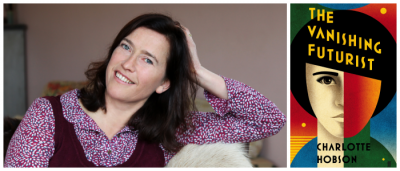Author Spotlight: Charlotte Hobson
16th May, 2017
Here are Charlotte Hobson’s brilliant answers to our questions about her novel The Vanishing Futurist, and about being shortlisted for the Prize.
What do you think about being shortlisted for the Walter Scott Prize for Historical Fiction? Do you see yourself as a historical novelist?
Imagine a small mammal that’s been stuck down in its burrow for years and years. Suddenly, to its astonishment, friendly paws scrabble through the roof, sunshine and light floods in and the air fills with the sweet scent of blossom, warmth, companionship… that’s more or less how I felt on being shortlisted. I’d been writing The Vanishing Futurist for over a decade and my burrow had become a little stuffy. The Walter Scott Prize shortlist means not only that I’m out in the world again, but also, miraculously that all that time underground was worth it after all.
I see myself as a story-teller, nothing more specific than that. I suppose I’d still like to keep the whole field open for exploration. However, my current novel is also set in the past, so perhaps I am a historical novelist by nature. I have certainly always been a passionate reader of historical novels, from Jean Plaidy and Mary Renault as a teenager, to Hilary Mantel and Sarah Waters now. When I was a student at Edinburgh I read Walter Scott, and later in Russia was pleased to find he was still widely read there.
How did the people and times you write about in this novel first lodge in your imagination?
I was first introduced to the Russian Futurists at University in Edinburgh, and immediately fell for their jokey hyperbole, wildness and astonishing talent. In Russia during the nineties the Avant-Garde were still being rediscovered and celebrated, having been out of official favour since the end of the twenties. I was able to see revivals of their experimental theatre productions, recreations of their Utopian projects. But it wasn’t until I began to read up on the fates of British governesses during the Revolution that I found my way into the story.
What role does research have in your writing? When does the fiction take over from the facts?
Research of course plays a huge part, and one reason I took so long to write this novel was because I simply couldn’t stop reading, more and more and more. A kind friend, an author, told me at last, ‘You can do too much research, you know.’ So I stopped checking every sentence, every reference, and left all that until I did a comprehensive fact-check at the end. At a certain point I think you have to relinquish control and allow your subconscious to weave its way through the facts. You hope that, by that time, you have internalised the knowledge enough to wear it lightly; you also have to be willing to edit. Chop and slice off all those pesky barnacles of research that weigh the narrative down! Throw them overboard from the steamer of modernity, as the Futurists might have said.

